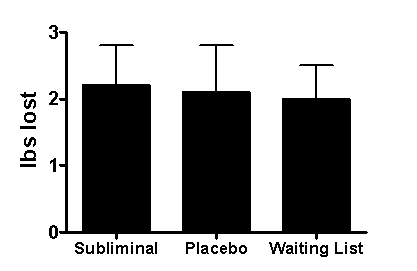Use the following to answer questions
Scenario I
Scenario I is based on and presents fabricated data consistent with the following study:
Merikle,P.M. ,& Skanes,H.E.(1992) .Subliminal self-help audiotapes: A search for placebo effects.Journal of Applied Psychology,77(5) ,772-776.doi:10.1037/0021-9010.77.5.772
Merikle and Skanes (1992) investigated the effectiveness of subliminal self-help audiotapes to promote weight loss in overweight females seeking to lose weight.Participants were randomly assigned to groups.Participants in two groups were instructed to listen to audiotapes containing subliminal messages associated with weight loss daily.Group 1 (the subliminal group) actually received these tapes.Group 2 (the placebo group) received tapes containing subliminal messages associated with relieving dental anxiety.Finally,a third group of participants was not given audiotapes and was told that they were on a waiting list to participate in the study.All participants-including the participants on the waiting list-were weighed weekly for 5 weeks.The average total weight loss (and standard deviations) for the three groups after the fifth week is presented in Figure 5.1.
Figure 5.1 
-(Scenario I) Suppose that a company markets a subliminal audiotape designed for people wanting to lose weight.As evidence that the product is effective,it cites a study based on 500 randomly selected overweight participants demonstrating that people listening to the tapes for 10 weeks lost-on average-6 pounds.Which statement is NOT a reason to be skeptical of these claims?
Definitions:
Sensory Overload
A condition where one or more of the body's senses experiences overstimulation from the environment.
Yielding
The act of giving in or surrendering to a force, argument, or influence.
Inoculation
A psychological technique used to make individuals resistant to attempts to change their attitudes or beliefs by exposing them to small doses of arguments against their position.
Psychological Reactance
The emotional response in opposition to a restriction on personal freedoms or choices, leading to an urge to regain them.
Q1: A mother wakes up in the middle
Q11: After Ginger fell on stage during her
Q54: The process by which we transform what
Q78: About 50% of the adult population are
Q111: Which statement about dreaming during non-REM (NREM)stages
Q119: _ a stimulant results in _.<br>A)Withdrawal from;fatigue
Q134: The type of consolidation that occurs over
Q192: What percentage of adults meets the criteria
Q198: People are MOST sensitive to the range
Q316: Blocking of memory is MOST prevalent in:<br>A)adolescents.<br>B)young